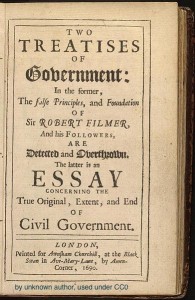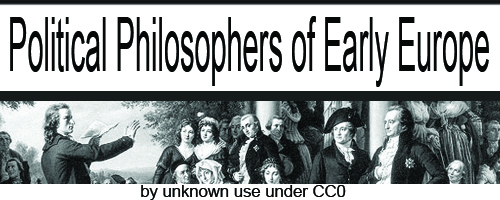John Locke
by Kassie Shellabarger
A British philosopher by the name of John Locke was born in 1632. His parents were Puritans with his father being an attorney to the local Justices of the Peace. The status of his family gave him the opportunity to go to Westminster School in London. In Britain, the Civil War broke out ten years after Locke was born. From there, he lived through the overthrow of the monarch, the interregnum of the Cromwell’s Republic, the Restoration, as well as the overthrow of another monarch in the Glorious Revolution. Through all of this, he formed his own views on politics and government.(1)
Locke’s most prominent concept is his theory on the natural law and rights. He believed that divine law and natural law have the ability to overlap in their content. He had no problem with the Bible commanding a stricter moral code than natural law, but he did not agree with the Bible’s teachings that were opposite of the natural law. Locke identified the responsibilities of the natural law only when they do not conflict with one’s preservation. By this, Locke believed that people should be able to put themselves above any duties that are expected of them. Locke highlighted that people should have the right to life, liberty, and property. (2) This concept can be seen in the Declaration of Independence which says, “We hold these truths to be self-evident, that all men are created equal, that they are endowed by their Creator with certain unalienable Rights, that among these are Life, Liberty and the pursuit of Happiness.”(3)
 Two Treatises in which he writes about the issue of property. There are three proponents to how people should own property. A person can only have as much property as he can use without his crops spoiling. A person must leave other people with land that is “enough and as good”. Finally, a person will obtain this property by his labor and hard work. (2) The First Treatise criticizes Robert Filmer’s support for a king’s divine right. Filmer’s theory stated that every man is born a slave to the kings. Locke did not agree with this theory, because based on God’s law, he believed that every man has the ability to govern himself morally. The Second Treatise was written to suggest a solution to England’s political troubles.(4) In this section of the Treatise Locke defines political power as, “the power of making laws and executing penalties, the preservation of property, and of employing the force of the community in executing the laws and defending the commonwealth from foreign attack.” This power should only be used for the public good.(4) He says that laws work because people accept them, and laws are for the public good. He believes that every man is held to the laws of nature, but man is able to do what he wants with his life. Man is free from the laws placed by other men, but they have a duty of protecting the good of others since they are all children of God which makes them equal. He also states that man has a duty to punish those who do not obey God’s will and try to harm another man.(4)
Two Treatises in which he writes about the issue of property. There are three proponents to how people should own property. A person can only have as much property as he can use without his crops spoiling. A person must leave other people with land that is “enough and as good”. Finally, a person will obtain this property by his labor and hard work. (2) The First Treatise criticizes Robert Filmer’s support for a king’s divine right. Filmer’s theory stated that every man is born a slave to the kings. Locke did not agree with this theory, because based on God’s law, he believed that every man has the ability to govern himself morally. The Second Treatise was written to suggest a solution to England’s political troubles.(4) In this section of the Treatise Locke defines political power as, “the power of making laws and executing penalties, the preservation of property, and of employing the force of the community in executing the laws and defending the commonwealth from foreign attack.” This power should only be used for the public good.(4) He says that laws work because people accept them, and laws are for the public good. He believes that every man is held to the laws of nature, but man is able to do what he wants with his life. Man is free from the laws placed by other men, but they have a duty of protecting the good of others since they are all children of God which makes them equal. He also states that man has a duty to punish those who do not obey God’s will and try to harm another man.(4)
In Letter Concerning Toleration, Locke writes about religion and politics. He states that religious groups are voluntary and that the government should not be able to force people into a religion. He says that people who persecute others over small differences in religion are those who pose a threat to their eternal state. He gives three reasons for why the government should not force its people into a religion. First, nowhere in the Bible does it command the government leaders to bring people to the “true faith”. This reasoning can be seen in his Two Treatises which aims to establish freedom and equality. Also, people must give consent to be brought to the “true faith”. This is impossible for the simple fact that people do not wish to believe what their government tells them to believe. People believe what they think is true; if they do not think it is true, they will not believe it. Locke’s second reason is that force from the government will not bring people to true religion, because only inward persuasion of one’s mind will be able to accomplish this. He says that since the government’s power is only based on force, it will not accomplish the goal of bringing people to true religion. His third and final reason is that even if the government was able to get people to accept the religion, it would not bring more people to the true religion because several governments from all over the world believe in false religions. (2)
From this, we see the political views and ideas Locke had throughout his life. He wanted men to be able to have freedom. This freedom included being able to worship how one wants and owning one’s own land. He believed that government should not intervene in its citizens’ lives and allow them to go about their lives as they wish as long as they are obeying God’s will and not harming anyone. Locke can be seen as revolutionary, because he has had an impact on government. Governments can be seen as in control of the people as well as to protect people’s rights and support the public good (2). He even had an influence on the Declaration of Independence.
(1) Moseley, Alexander. “John Locke: Political Philosophy.”Internet Encyclopedia of Philosophy. N.p.. Web. 13 Apr 2014. <http://www.iep.utm.edu/locke-po/>.
(2) “Locke’s Political Philosophy.” Stanford Encyclopedia of Philosophy. N.p., 9 Nov 2005. Web. 13 Apr 2014. <http://plato.stanford.edu/entries/locke-political/>.
(3) Jefferson, Thomas. “Declaration of Independence .” The Charters of Freedom. N.p., 4 Jul 1776. Web. 12 Apr 2014. <http://www.archives.gov/exhibits/charters/declaration_transcript.html>
(4) Locke, John. Two Treatises on Government. London: Printed for R. Butler, etc., 1821; Bartleby.com, 2010. www.bartleby.com/169/. [Date of Printout].
Further Learning:
